|
|
|
Sort Order |
|
|
|
Items / Page
|
|
|
|
|
|
|
| Srl | Item |
| 1 |
ID:
169140


|
|
|
|
|
| Summary/Abstract |
Vietnamese ‘blue boats’ – small wooden‐hulled fishing boats – are now entering the territorial waters of Pacific Island countries and illegally catching high‐value species found on remote coastal reefs. Crossing several international boundaries and traversing a distance of over 5000 km, these intrusions have alarmed Oceanic countries, including Australia. Lacking administrative capacity as well as jurisdictional authority to effectively control the vast stretches of island coastlines individually, governments and intergovernmental bodies in the region have called for strengthened coordination of surveillance efforts while also pressuring Vietnam diplomatically. This paper reviews these latest developments and is the first to provide a focused assessment of the issue. Through the lens of Copenhagen School of securitisation theory, we analyse responses of national and regional actors and their portrayal in online media to understand how blue boats are constructed as a security threat within a narrative of maritime, food and human security. Arguably, Australia together with the Forum Fisheries Agency, who advise on the governance of offshore tuna resources, have so far acted most decisively – in a way that might see them extend their strategic role in the region. We propose a comprehensive empirical research agenda to better understand and manage this nascent, flammable and largely unpredictable inter‐regional phenomenon.
|
|
|
|
|
|
|
|
|
|
|
|
|
|
|
|
| 2 |
ID:
169144
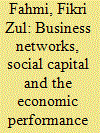

|
|
|
|
|
| Summary/Abstract |
This study examines the ways in which networking characteristics and practices influence the economic performance of creative and cultural industries. The notion of social capital is used to conceptualise the complex nature of networks, including both professional and social relationships that occur on multiple levels. This qualitative study is set in the context of Indonesia, in which two cases are examined: creative apparel entrepreneurs in Bandung and batik producers in Surakarta. The results show that regional environments provide opportunities for creative industries to find specialist suppliers, to gather market information and, importantly, to find and cross‐fertilise new ideas. Although regions provide these opportunities, the firms’ internal social capital is crucial in being able to internalise and transform the knowledge from the environment into innovative values embodied in their products.
|
|
|
|
|
|
|
|
|
|
|
|
|
|
|
|
| 3 |
ID:
169139


|
|
|
|
|
| Summary/Abstract |
In what ways are lifestyles in urbanising Thailand, increasingly oriented towards shopping malls related to the threat to the wildlife and struggles for subsistence in distant Lao hinterlands? Our article answers this question by looking at the workings of electricity as the key infrastructure that connects these seemingly unrelated events and practices. We argue that the circulation of electricity flows along uneven channels, shifting injury and environmental harm across international borders. This circuit is perpetuating inequality and environmental injustice in the Lower Mekong. To demonstrate this claim, we analyse the electricity sector at numerous scales and locations – the urban scale in Bangkok, the country scale of Thailand and then Laos and the local community scale in Laos. We then discuss by what means various material and social processes and actors at these different scales form this circuit. Looking at circuits of power allows us to link the story of electricity consumption with that of production, with an emphasis on their extraterritoriality, multiplicity and boundaries. Our findings illustrate the effects of this circuit on spaces far from a thought‐of urban area. Furthermore, we demonstrate the ways in which these effects have produced inequality and injustice across borders.
|
|
|
|
|
|
|
|
|
|
|
|
|
|
|
|
| 4 |
ID:
169138


|
|
|
|
|
| Summary/Abstract |
The relationship between commuting distances and where people work has been studied for urban contexts in both developed countries and developing countries. However, few studies have examined the situation in rural areas, and none look at commuting distances to non‐farm workplaces in rural areas of developing countries. This paper investigates how commuting distance, and thus accessibility, to local non‐farm work influences non‐farm employment and out‐migration from rural villages in Northeast Thailand. The main issues examined are: (i) the distance that rural residents travel to work in local non‐farm jobs; and (ii) the influence that local non‐farm employment has on the number of outmigrants from rural villages. The study finds: (i) distance between villages and non‐farm work sites impact the number of villagers who are employed in regular wage work; (ii) beyond 20 km villagers are less likely to travel to non‐farm employment using their own means of transportation; and (iii) employment in regular wage work decreases outmigration. The findings from this study contribute to the debates over the drivers of rural out‐migration, rural livelihood changes, and agrarian changes that are taking place in Southeast Asia.
|
|
|
|
|
|
|
|
|
|
|
|
|
|
|
|
| 5 |
ID:
169136


|
|
|
|
|
| Summary/Abstract |
It appears that an almost unquestioned development pathway for achieving gender equity and women's empowerment has taken centre stage in mainstream development. This pathway focuses on economic outcomes that are assumed to be achieved by increasing women's access to material things, including cash income, loans, physical assets, and to markets. Gender equity indicators, which measure progress towards these outcomes, cannot escape reinforcing them. We argue that far from being neutral, indicators are embedded in political and ideological agendas that serve as guides to the appropriate conduct of those whose performance or behaviour is being measured. Drawing on participatory feminist, diverse economies and strengths based approaches, we outline a research methodology for developing community‐based indicators that recognises women's and men's participation and relationships in all spheres of life, including the ‘non‐economic’. If indicators are grounded in local meanings and realities, we propose that community members can use them to identify aspirational goals for gender equity, and measure progress towards these goals.
|
|
|
|
|
|
|
|
|
|
|
|
|
|
|
|
| 6 |
ID:
169146
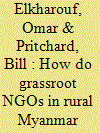

|
|
|
|
|
| Summary/Abstract |
Recent research has promoted the idea that political struggles over food systems can be understood through the concepts of food security (the right to access food) and food sovereignty (the right to exercise control over food systems). These concepts emphasise different political priorities in the social relations of food: for the former, the promotion of decent work and the strengthening of the social safety net to enhance people's abilities to put food on their plates; for the latter, the defence of land, water and resource rights, to underpin capabilities for food own‐provisioning. The question we pose in this paper is how these priorities are articulated by grassroots non‐government organisations working at the frontline of global food poverty? Interviews with 22 representatives of food‐related non‐government organisations in Myanmar were used to elicit narratives about how they understood their challenges. The paper finds that narratives did not cohere exclusively to either the food security or food sovereignty concept, but blended ideas associated with the political priorities of both in complex and contradictory ways. These insights lend important firsthand evidence to the argument that supports a multi‐dimensional framing of the politics of food that is inclusive of the diverse struggles highlighted by food security and food sovereignty concepts.
|
|
|
|
|
|
|
|
|
|
|
|
|
|
|
|
| 7 |
ID:
169142


|
|
|
|
|
| Summary/Abstract |
In the Mekong Region, the Asian Development Bank and partners have promoted economic corridors as a way to achieve regional economic integration and growth. This study evaluates how a transboundary policy narrative of shared prosperity around the East–West Economic Corridor programme emerged, and then how it was elaborated and used, taking a set of border policies of the government of Thailand as cases. For two decades the shared prosperity narrative has been used by a coalition of elite actors to support a programme of investments in road infrastructure, as well as to push for agreements on trade, border logistics, investment and tourism. The shared prosperity narrative has helped maintain support for the programme despite its failures to meet projections and expectations. Although criticised by civil society and experts from time to time, no coherent shared counter‐narrative emerged. Policy elites in Thailand have used the transboundary narrative to justify investments in special economic zones, and transport infrastructure near the border and inside neighbouring countries. Thailand has also reproduced the narrative in support of efforts to bolster tourism cooperation, and negotiate cross‐border trade and logistics agreements. Roads and bridges have been built, underlining how discursive practices have material consequences and reinforce the narrative.
|
|
|
|
|
|
|
|
|
|
|
|
|
|
|
|
| 8 |
ID:
169137
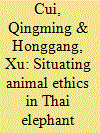

|
|
|
|
|
| Summary/Abstract |
Following ethical contextualism, this article situates different animal ethical principles, from anthropocentrism to non‐anthropocentrism and relational caring ethics, in Thai social contexts in order to examine whether these principles can lead to a sustainable ethical practice in elephant conservation. The results show that, as non‐anthropocentrism, animal rights ethics are impractical in Thailand because of temporal, spatial, economic and social constraints. As weak anthropocentrism, animal welfare ethics endorse the tourism industry to commercialise the encounter value of elephants by developing elephant camps. Along with animal welfare, relational ecofeminism justifies the emerging model of elephant sanctuaries. Both camp and sanctuary models create a work‐for‐care cycle, in which elephants work to generate economic gains, some of which are in turn used to care for elephants. However, because of evolving social situations, such as potential market competition and poaching of wild elephants, the morality of the work‐for‐care cycle is weak and can be challenged. Nevertheless, sanctuaries offer a direction for a local solution because of their potentially responsible business model. In conclusion, there is not a single set of ethics that can solve all problems and be sustainable in all contexts.
|
|
|
|
|
|
|
|
|
|
|
|
|
|
|
|
| 9 |
ID:
169141


|
|
|
|
|
| Summary/Abstract |
The paper conceptualises the process of voluntary relocation undertaken by rural farmers to informal settlements in coastal cities. These are journeys that occur without formal institutional support, utilising migrants' own agency. Learning from these community‐driven relocations has merit in rethinking climate change adaptation at the regional level. In this paper we present stories of 17 families who have progressively relocated to the fringes of Khulna city in southwestern Bangladesh. We observe three key attributes: first, relocations are slow, neither singular nor immediately completed, but rather take months of careful back and forth journeys of family members between their places of origin and destination. Second, relocations rely on small networks of relatives and acquaintances at the destination. Third, relocations are built on shared responsibilities distributed among a range of actors in places of origin and destination. We conclude that these slow, small and shared relocations are likely to be realised as forms of ongoing adaptation by rural farmers if their aspirational mobilities, social relations and supports are maintained at a regional scale. This kind of migration as adaptation may bring about just outcomes for those displaced without necessarily promoting rigid planning interventions that tend to fix resettlement solutions in place and time.
|
|
|
|
|
|
|
|
|
|
|
|
|
|
|
|
| 10 |
ID:
169143
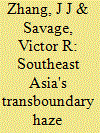

|
|
|
|
|
| Summary/Abstract |
This paper examines the political intricacies inherent in the management of Southeast Asia's transboundary haze pollution. It argues for a scalar perspective in understanding the complexities of the haze problem. The so‐called ‘inconvenient truth’ is unravelled by teasing out some issues in the national and regional political ecologies, and the challenges of synchronising co‐operation at the national, regional and global scales. Discussion shows that the ‘environment’ takes on different meanings at each scale, and both Indonesia and the Association of Southeast Asian Nations (ASEAN) need to recognise this in order to engage more effectively with the transboundary environmental issue. Specifically, inadequate management of forest resources in Indonesia, ASEAN's principle of ‘non‐interference’ and a lack of a holistic ecosystem perspective are amongst some of the interconnected issues addressed. The paper calls for a greater awareness of structural weaknesses in the management of forest resources and a change in ASEAN's environmental paradigm to a more holistic ecosystem perspective that prioritises not just environmental and human health, but also a healthy and sustainable ecosystem.
|
|
|
|
|
|
|
|
|
|
|
|
|
|
|
|
| 11 |
ID:
169135


|
|
|
|
|
| Summary/Abstract |
Rapid population growth in Pacific island cities far exceeds employment opportunities and is contributing to rising urban inequality and social exclusions. Livelihoods in the informal urban sector, such as market vending, provide much needed income, rural–urban connectivity and food security, but remain largely excluded from policy and planning frameworks. Spatial, economic and social exclusions limit vendors’ economic advancement, their influence over decision‐making, and their access to basic services. Local communities close to informal markets fill some of the gaps left by the policy neglect, but investment and strategic management remains inadequate when vendors do not have secure market places and recognised rights to work. This article reports on a study of three informal markets in Honiara, Solomon Islands. These markets lack legal status but make significant contributions to urban development and economic opportunities. Drawing on surveys and focus groups with vendors and urban decision‐makers we explore the impact of informal markets on urban economies, how social and institutional relationships hinder vendors’ economic advancement, and the opportunities to create more inclusive livelihoods that could contribute to equitable cities.
|
|
|
|
|
|
|
|
|
|
|
|
|
|
|
|
| 12 |
ID:
169145
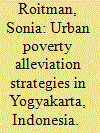

|
|
|
|
|
| Summary/Abstract |
A multidimensional understanding of poverty includes the access of poor groups to decision‐making processes based on their needs and aspirations. However, the realisation of this ‘right to make decisions’ faces multiple obstacles. Over the last 20 years in Indonesia, in a context of a more democratic political environment and policy decentralisation, poverty alleviation policies have followed institutional arrangements to provide communities with opportunities for greater participation in development projects. Poverty data show a clear improvement in the living conditions of urban poor citizens in Indonesia; however, it is unclear whether poor communities have become stronger and more independent from public grants and better able to make their own decisions. This research analysed two urban poor communities in Yogyakarta, Indonesia, and found that some communities working on participatory poverty alleviation strategies still face obstacles to becoming more independent and making their own decisions because they remain part of an historical legacy of top‐down approaches to poverty, highly dependent on government support and working only within ‘invited spaces’. Conversely, those communities with more limited access to government funding have been more innovative in their strategies and have created ‘invented spaces’ for collective action that allows them to be more independent and empowered.
|
|
|
|
|
|
|
|
|
|
|
|
|
|
|
|
|
|
|
|
|